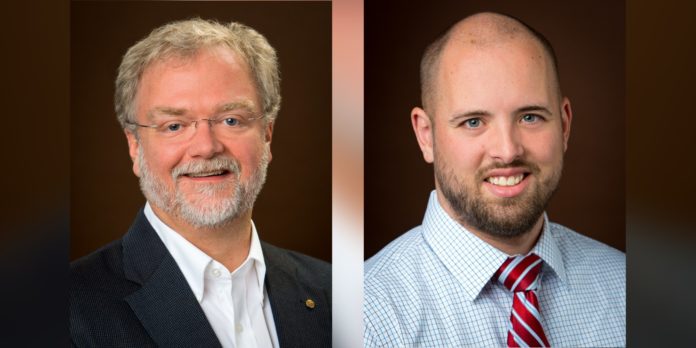MACON – Mercer University School of Medicine professors Bowden Templeton, Ph.D., and Morgan Stinson, Ph.D., recently received a $403,000 grant from the U.S. Department of Agriculture to equip eight rural and medically underserved Georgia counties with telehealth technology to address behavioral and mental health needs.
The Integrated Telebehavioral Health Project will provide telebehavioral health and psychotherapy services to residents of Johnson, Washington, Telfair, Warren, Hancock, Sumter and Clay counties. All eight are among 151 Georgia counties currently listed as Mental Health Professional Shortage Areas by the U.S. Department of Health Resources and Services Administration.
Coordinated in the Master of Therapy (MFT) program, the project also creates opportunities for MFT students to gain experience providing telemental health services, an increasingly important means through which practitioners are reaching rural populations.
“Mercer University School of Medicine is deeply committed to the overall health of rural Georgians,” said Jean Sumner, M.D., dean of the School of Medicine. “Mental health is an area of significant need in rural Georgia, and it is a privilege for our Master of Family Therapy program to have the opportunity to support families in these rural counties.”
Telehealth technologies are important lifelines for patients in rural areas. The project will enable 10 sites in the eight counties to establish a high-definition telehealth and remote monitoring program to provide behavioral/mental healthcare services that are not currently available in their communities, including behavioral health assessment, substance use assessment, and psychotherapy treatment and referral.
Through the proposed telehealth system technology, patients will gain access to specialists not currently available due to geographic barriers and physician and mental health provider shortages, and providers will be able to share existing resources across a greater scale.
The three-year program will be led by Dr. Templeton, associate professor of psychiatry and behavioral sciences and director of the MFT program, and Dr. Stinson, assistant professor of psychiatry and behavioral sciences. Both faculty members have worked extensively to integrate behavioral health training and services in medical education and primary care settings.
“Mental health is a pillar of overall health and well-being, and a majority of Georgia’s citizens have limited access to treatment when services are needed,” said Dr. Templeton. “These funds will connect citizens in underserved counties to needed services and directly improve the lives of Georgians.”
About Mercer University School of Medicine (Macon, Savannah and Columbus)
Mercer University’s School of Medicine was established in 1982 to educate physicians and health professionals to meet the primary care and health care needs of rural and medically underserved areas of Georgia. Today, more than 60 percent of graduates currently practice in the state of Georgia, and of those, more than 80 percent are practicing in rural or medically underserved areas of Georgia. Mercer medical students benefit from a problem-based medical education program that provides early patient care experiences. Such an academic environment fosters the early development of clinical problem-solving and instills in each student an awareness of the place of the basic medical sciences in medical practice. The School opened a full four-year campus in Savannah in 2008 at Memorial University Medical Center. In 2012, the School began offering clinical education for third- and fourth-year medical students in Columbus. Following their second year, students participate in core clinical clerkships at the School’s primary teaching hospitals: Medical Center, Navicent Health in Macon; Memorial University Medical Center in Savannah; and The Medical Center and St. Francis Hospital in Columbus. The School also offers master’s degrees in family therapy, preclinical sciences and biomedical sciences and a Ph.D. in rural health sciences.










